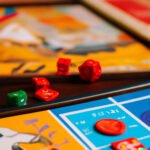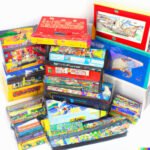Introduction
Board games for stroke recovery can be a great way to aid in rehabilitation and recovery. They are a fun, interactive solution that can help patients regain motor skills, improve communication abilities, and provide some emotional respite from the daily grind of physical therapy. Playing board games can stimulate creativity and help develop problem-solving skills. The cognitive ability to take turns, observe another player’s moves or anticipate the strategic implications of taking a certain action are all improved through playing board games. Furthermore, learning the rules of the game helps stimulate long-term memory processes which is incredibly beneficial with stroke recovery since many patients have difficulty remembering things post stroke. Once able to play these types of games, it helps them better understand their own movements as well as other’s reactions in a real life setting.
Other than cognitive development, there is also an emotional benefit when it comes to board games in stroke recovery – many who had debilitating strokes commonly feel isolated or depressed afterward due to decreased mobility or difficulty socially interacting with others; playing board games can act as a sort of “social lubricant” – connecting family members and friends together again and sparking conversations not centered around the patient’s particular situation but instead focused on winning strategy and healthy competition. This renewed excitement for physical activity is great for improving overall morale during this difficult phase of recovery from any type of stroke.
Types of Board Games
There are many different types of board games that can be beneficial for stroke recovery. Memory improvement games, such as crosswords and chess, can help to sharpen and strengthen the neural system, while physical coordination-based games, such as Connect Four and Jenga, can help improve upper extremity function by increasing the range of motion of affected muscles, as well as hand-eye coordination. Similarly, there are also coordination-based board games that involve throwing or catching a small ball (i.e., Bocce Ball).
Emotional wellbeing is an important factor in stroke recovery. Games which bring cheerfulness, mindfulness and relaxation are especially beneficial in this regard. Creative thinking activities like Mind Trap or lateral thinking puzzles can spark new ideas and promote problem solving skills. Board games like Battleship can also assist with fine motor skill development; they require participants to place pieces on the game board accurately while following directions. Lastly, strategy-based board games such as Risk or Backgammon require players to think strategically in order to make informed decisions throughout the game, often improving their logical reasoning skills and spatial awareness.
Benefits
Board games can provide significant benefits in stroke recovery. Cognitively, as people play certain board games, they must use their higher-order processing skills in order to make informed decisions and reach a desired outcome. This cognitive engagement can help stroke survivors build on any existing cognitive abilities, such as memory and problem-solving skills. Additionally, physical skills can be developed through game activities such as rolling dice, moving pieces or cards, or picking up and setting down objects. These activities help individuals practice functionality of the affected parts of their body to promote more independent mobility. Finally, playing board games also increases positive emotions associated with optimism and hope as it provides an avenue to establish a sense of normalcy and connectedness. Connecting with others while engaging in fun activities may reduce feelings of isolation and create emotionally rewarding experiences that help build self-confidence which is beneficial when recovering from a stroke.
Popular Games
Some of the most popular board games used for stroke recovery are Chess, Checkers, Yahtzee, Scrabble and Go. These timeless favorites provide a wealth of cognitive benefits. Chess allows players to strategize and stimulates the brain. As a complex game involving multiple layers of potential moves, it can help stroke survivors improve their problem solving skills.
Checkers provides a stimulating thinking exercise similar to that of chess but requires fewer pieces thus making it easier for lower functioning patients to participate in game play. It is an excellent way to practice formulating patterns and analyzing chances. It also teaches forward thinking which is beneficial to those recovering from stroke damage.
Yahtzee helps with being able to recall numbers as well as counting dice throws which can lead to improving basic math calculations and dexterity when switching between pieces on the board or cards in hand. This can be beneficial for stroke survivors who may have had difficulty with performing such basic tasks before the injury due to physical impairments.
Scrabble is an exciting game that helps sharpen writing, spelling, memorization and vocabulary skills while having fun doing so. Its strategic approach encourages players to plan their moves out and think strategically about their best-laid plans for each turn taken.
Go is another complicated yet easy-to-learn strategy game that has been played by millions across the globe for thousands of years thanks its simple but diverse ruleset allowing for multiple steps ahead planning which helps train memory capacity as well as critical thinking skills during gameplay. The main benefit from playing Go would be the improvement of spatial reasoning due its nature of requiring squares on the board which can be manipulated by both opponents in order create kingdoms or break them down depending how they are used on each turn taken by either side”making it great tool exercising patient’s mental abilities while having fun doing so!
Creative Ideas
Board games can be adapted and modified to meet different needs and levels of recovery, allowing stroke survivors to engage in cognitive stimulation and fun. For instance, you could offer adjustable game speeds, so players can move at a pace that is comfortable for them. Adapted rules can also be implemented such as removing or removing complex game pieces, providing sound cues for play direction or dividing large tasks into small easier ones. In addition, “modified” games where each player matches the same answer instead of competing against one another can be helpful for those with limited communication skills. Finally, passive games ” either table top or video ” may also support stroke survivors in their recovery process by requiring less coordination but offering the same amount of fun.
Tips
Playing board games for stroke recovery can be an important part of the rehabilitation process. It can help boost cognitive rehabilitation and improve communication skills as well as help regain physical strength. There are steps that can be taken to make a board game session beneficial for stroke recovery.
One tip is to set achievable goals when setting up and playing a game. You don’t want to be too ambitious but having specific goals in mind will keep the person motivated throughout their therapy session.
Using external aids while playing can also provide an extra layer of support while keeping the game fairly competitive. For example, larger pieces, specialized dice, or sound cues may all help the person who is recovering from a stroke.
Finally, breaking down complex tasks into smaller steps is essential for a positive outcome. If a more complicated game proves to be too daunting, break it down into smaller components, so that each task has fewer demands and becomes easier to manage. This way the person with the stroke will have time to think, pause and progress based on their own pace.
Conclusion
Board games have a wide range of therapeutic benefits for stroke survivors. Playing these games can help to improve hand-eye coordination, muscle memory, concentration, and spatial awareness. Additionally, the social aspect encourages interaction with other people and the development of communication skills. Board games also provide an opportunity to practice problem-solving thinking and promote feelings of accomplishment and self-confidence. Playing board games on a regular basis during recovery has been demonstrated to improve overall functionality for survivors of stroke.

I love playing all kinds of games – from classics like Monopoly to modern favourites like Ticket to Ride.
I created this blog as a way to share my love of board games with others, and provide information on the latest releases and news in the industry.





